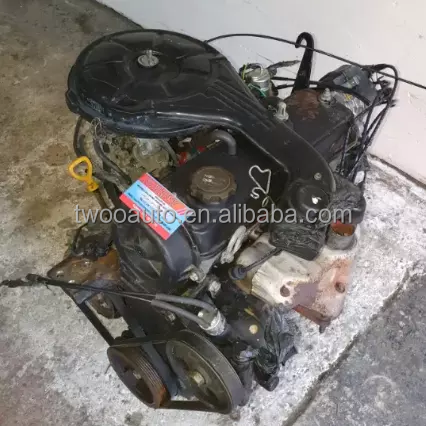Toyota Tazz: The Perfect Combination of Efficiency and Style in a Compact Car
Toyota Tazz: The Perfect Combination of Efficiency and Style in a Compact Car
Blog Article
Check Out the most recent Fads in Engine Technology Via Tazz
In the quickly evolving landscape of automobile innovation, Tazz stands at the forefront, highlighting considerable developments in engine systems that focus on both development and sustainability. tazz. From hybrid engines that maximize gas efficiency to the appearance of hydrogen gas cells, the trends forming contemporary powertrains are not only enhancing efficiency but likewise dealing with critical environmental obstacles. As the industry remains to press boundaries, it is important to think about just how these developments will certainly influence future transport solutions and the wider effects for global energy intake. What lies ahead in this crucial transformation?
Hybrid Engine Innovations
Crossbreed engine advancements stand for a critical change in auto innovation, incorporating the benefits of internal burning engines with electrical propulsion systems. This combination not just improves fuel effectiveness however likewise lowers exhausts, meeting significantly rigid ecological laws. By utilizing both energy resources, hybrid engines can enhance performance, delivering power when needed while preserving fuel throughout less demanding driving conditions.
Recent developments in crossbreed innovation consist of improvements in battery effectiveness and regenerative stopping systems. These innovations permit better energy healing during slowdown, which can be redirected to aid in acceleration or power accessory systems. In addition, manufacturers are concentrating on lightweight materials and portable styles to maximize the effectiveness of hybrid powertrains.
The development of plug-in hybrids has also broadened the market, enabling drivers to charge their vehicles making use of typical electric outlets. This feature often enables significant all-electric variety, additional reducing reliance on traditional fuels. tazz. As the automobile market continues to evolve, hybrid engine modern technologies are expected to play a vital role in bridging the space between traditional cars and fully electric designs, offering a transitional remedy that satisfies varied customer requirements and preferences
Advances in Electric Powertrains
The vehicle landscape is swiftly developing, with electric powertrains emerging as a leading pressure in sustainable transport. Advancements in electric vehicle (EV) modern technology are significantly boosting user, performance, and performance experience. Secret technologies consist of enhancements in battery chemistry, which have actually increased power density, minimized billing times, and prolonged general battery life.
Solid-state batteries, for instance, assure to reinvent the marketplace by giving better security and performance compared to standard lithium-ion cells. Improvements in regenerative stopping systems are making it possible for vehicles to recover power during slowdown, adding to overall performance.
In enhancement to battery innovation, electrical motor layouts are becoming extra innovative. Technologies such as incorporated electric motors and advanced thermal monitoring systems are helping to enhance power delivery and decrease weight, ultimately enhancing automobile characteristics.

Collectively, these advances underscore the dedication to transition towards cleaner, extra effective transport options, placing electrical powertrains at the leading edge of vehicle innovation.
The Rise of Hydrogen Gas Cells
Significantly, hydrogen gas cells are gaining grip as a sensible alternative to conventional inner burning engines and battery electric automobiles. This technology utilizes the chemical energy stored in hydrogen, transforming it into electricity via an electrochemical response with oxygen. The primary byproduct of this process is water, making hydrogen fuel cells an eco pleasant choice with no discharges at the tailpipe.

Car manufacturers are progressively purchasing hydrogen gas cell technology, acknowledging its potential for long-range applications and rapid refueling capacities that equal conventional gas. Furthermore, fields such as sturdy transport and public transportation are specifically fit for hydrogen gas cells, where battery electrical remedies may fall short due to weight and range limitations.
As research study and investment continue to expand, hydrogen gas cells are positioned to play a significant duty in the future landscape of tidy transport and power remedies.
Enhancements in Internal Burning Engines
Developments in internal combustion engine (ICE) technology are transforming standard cars to fulfill modern environmental criteria and efficiency assumptions. One of the most considerable enhancements includes the combination of advanced fuel shot systems. These systems maximize the air-fuel mix, improving combustion effectiveness and causing lowered emissions. Direct gas shot, for example, enables for far better atomization of gas, causing more total combustion and improved power outcome.
In addition, turbocharging has gotten importance, permitting smaller engines to supply greater efficiency without the weight of bigger engines - tazz. This modern technology not just improves effectiveness but additionally contributes to decrease gas consumption. Variable shutoff timing systems are likewise being fine-tuned, allowing engines to adjust to various driving problems for improved torque and responsiveness
In addition, using light-weight materials in engine building and construction is navigate to these guys becoming standard, more improving gas performance by reducing total lorry weight. Engine control units (ECUs) are increasingly innovative, enabling real-time changes that optimize performance and exhausts.
These enhancements jointly signify an essential change in ICE innovation, straightening with worldwide sustainability goals while still providing the efficiency chauffeurs anticipate from their cars. As the industry evolves, these enhancements continue to shape the future of conventional automotive engineering.
Future Fads in Engine Effectiveness
Considerable developments in engine effectiveness are expected as manufacturers concentrate on integrating cutting-edge innovations to fulfill rigid environmental policies and consumer needs. The change in the direction of electrification, hybrid systems, and alternate gas is improving the vehicle landscape, driving developments that enhance gas economy and reduce emissions.
Among Homepage the vital trends is the execution of innovative products and making methods. Light-weight composites and high-strength alloys add to minimized car weight, hence improving total performance. Furthermore, the fostering of turbocharging and variable valve timing technologies permits enhanced power outcome from smaller sized engines, additionally enhancing gas economic climate.

Verdict
Advancements in crossbreed engine systems, electric powertrains, and hydrogen gas cells show a dedication to reducing emissions while boosting efficiency. Improvements in interior combustion engines and a focus on light-weight materials add to general engine performance.
From crossbreed engines that maximize gas performance to the emergence of hydrogen fuel cells, the trends shaping contemporary powertrains are not just enhancing performance however also addressing vital check it out ecological difficulties.Hybrid engine technologies stand for an essential change in automobile innovation, combining the benefits of internal combustion engines with electrical propulsion systems.Additionally, turbocharging has obtained importance, enabling smaller engines to deliver higher performance without the weight of bigger engines. Furthermore, the fostering of turbocharging and variable valve timing modern technologies allows for boosted power output from smaller engines, even more improving gas economic situation.
Enhancements in interior combustion engines and an emphasis on light-weight materials add to general engine efficiency.
Report this page